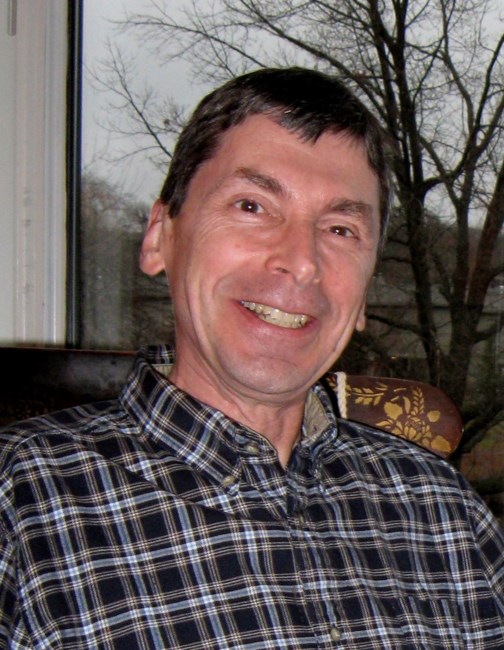
OBITUARY
Paul R. Bourassa
26 June, 1952 – 26 April, 2023

His death in the ICU came as a shock to his many relatives, friends, and coworkers, but although unexpected, it was peaceful. He took his last breaths as his sisters, brother-in-law, and a grand-niece and grand-nephew were praying the final lines of Psalm 91 (“He who dwells in the shelter of the Most High. . . . “). Paul lived in hope of the resurrection.
Born in Waterville, Maine, in 1952, Paul was the son of Roger and Roma (Richard) Bourassa. He grew up in nearby Winslow and was educated in local schools. Until his mid-fifties, his work, too, was local. For more than 25 years he was a machine operator at the Scott Paper Company. After the paper mill closed, he did custodial work at a business college, a newspaper office, and a parochial school. He was known for his sense of humor, dependability, and kindness.
Paul never married, but he was a family man. Until Roger and Roma’s deaths, his number one life goal was: “To care for my aging parents.” In 2008 this priority led him to move to Ann Arbor, where his widowed mother could enjoy the support of many relatives. These, in turn, enjoyed "Uncle Paul.” So did his neighbors. He was a good conversationalist, well-informed on everything from birds to fungi, from Dante to his French Canadian ancestry, from the war in Sudan to redlining in Detroit. He always had something interesting going on: woodworking projects (many involving marbles); experiments with gardening techniques and unusual plants; efforts—sometimes extraordinary—to assist the nesting trumpeter swans in his back yard. (On much of the above, see his short Glacier Hills interview on YouTube: https://www.youtube.com/watch?v=xg6qv9aZUuE . Or search for “Life in the Hills Bourassa 2021.”)
Whether he was relating to people, creatures, or the natural world, Paul’s default setting was to care and to help. This he did during his fifteen years as a custodian at Glacier Hills Senior Living Community. Friendly and thoughtful, conscientious to a fault, he prayed for everyone there as he cleaned bathrooms, hauled trash, vacuumed, washed windows, and did set-ups and take-downs. It was hard work—by his estimate, he walked some ten miles a day—but Paul was happy to be of service and valued his relationships there. It made his day when he could find a resident’s lost hearing aid, and every morning he enjoyed throwing balls to Edgar, another resident’s dog. He had a special concern for his coworkers and put in many hours off the clock so that he could get his work done and help them with theirs.
Paul had a strong sense of the dignity of work, however humble. When Covid hit, relatives urged him to take a leave of absence. “Your age and diabetes put you at great risk,” his brother-in-law told him. Pushing hard, he asked, “Won’t it be sad if one day we’re standing around your casket saying, ‘Too bad he couldn’t let someone else take out the trash’?” To which Paul gave an answer that gently pointed out the importance of this lowly task and the seriousness with which he approached it: “It takes skill and care to do any job well.” He did step back from his job for a time but eagerly returned as soon as he could.
Paul’s caretaking spirit turned him outward to the wider world. Every Sunday, he went to church with two bags of groceries: one for the food pantry, the other for a newspaper vendor he’d met on the sidewalk. He was as generous with his modest financial resources as he was with his time and made regular donations to many charitable organizations.
Given his reverence for the work of the Creator in the natural world, Paul was concerned about protecting the goodness and beauty of planet Earth. He lived with simplicity to reduce his carbon footprint. He grew vegetables. He biked to work, church, and the supermarket as much as possible. After his mother died, he turned the thermostat down. When his dryer broke, he stretched a clothesline across the laundry room. He took care of his health but wasn’t overly concerned about his appearance. His well-worn work jacket was held together with duct tape. “What’s wrong with that?” he asked his sister. “It’s the same color as the jacket.”
Paul lived a quiet, mostly hidden life. He would be surprised at how many people are grieving his loss and finding inspiration in his example. In his unassuming, caretaking way, he made an impact.
Paul is survived by sisters Louise (Kevin) Perrotta of Ann Arbor and Jeanne Locke, of Pennsylvania; cousins near and far; 12 nieces and nephews, 38 grand-nieces and nephews, and 12 great-grand-nieces and nephews.
On May 1, the feast of St. Joseph the Worker, Father Jonathan Perrotta celebrated the Mass of Christian Burial for his Uncle Paul at St. Thomas the Apostle Church. Paul’s remains will be buried later this year in the family cemetery plot in Maine. Eternal memory, blessed repose.
Memorial donations may be made to the Society of St. Vincent de Paul (https://sta2.org/church/svdp), Food Gatherers (www.foodgatherers.org), and Doctors Without Borders (www.doctorswithoutborders.org).
Show your support
Add a Memory
Share Obituary
Get Reminders
Services
SHARE OBITUARY
- GET REMINDERS
v.1.9.5